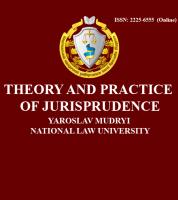Конституційний інститут охорони довкілля: порівняльно-правовий
Institute of constitutional protection of the environment: comparative legal aspects
Author(s): Dmitro Dmitrovič ZadykhayloSubject(s): Constitutional Law, Civil Law, International Law, Human Ecology, Environmental interactions
Published by: Національний юридичний університет імені Ярослава Мудрого
Keywords: constitutional regulation of environmental relations; the right to a safe environment; sustainable development policy; «Ecological system» constitutional institution;
Summary/Abstract: Formulation of the problem. The development of constitutional law although not as fast, but subordinate to the universal processes that affect any other area of law and legislation. One of these processes should include further specialization legislation deterministic deepening and expansion of social life, activities and interests. Analysis of recent publications. In the works of local scientists in the field of environmental law contains a number of works doctrinal nature, which are based on the development of legal regulation of environmental relations and issues of codification of environmental law. First and foremost among these scientists should be called Y.S. Shemshuchenko, A.P. Getman [3], V.I. Andreytseva [4] A.G. Bobkov [5], M.V. Krasnov, G.I. Baluk [6], V.V. Karakash and others. However, issues of completeness and consistency constitutional and legal principles to ensure legislative regulation of environmental relations in a comprehensive institution of the Basic Law was not implemented. Formulation purposes. The purpose of this article is to define the modern practice of constitutional rule-making in foreign countries institutionalization of ecological relations in the Basic Law, to create an adequate legal framework for the state, society and individuals in terms of deployment of the environmental crisis. Presenting main material. Analysis of texts of constitutions of a number of countries in Europe, Asia, Africa and Latin America on the constitutional and legal provision of environmental relations allows to make a number of findings that indicate no single «standard» technique of constitutional settlement. First, should separately identify the range of countries whose constitutions do not contain environmentally-law. This category include the US, Japan, Italy, Argentina and a particular exception – Germany. Secondly, one can identify a number of constitutions in which environmental problems given one article, which however may contain several provisions. This category can be subjected to internal differentiation depending on the application object opulent set criteria. This refers to the overall differentiation of environmental law in blocks, natural resource, environmental protection and ecological safety. On the other hand a number of constitutional documents is limited to the use of single or complex legal means for forming the rules of the Basic Law, such as the subjective right, a legal obligation, purpose of legal regulation and so on. However, in some countries there was a constructive constitutional and legal updating of environmental issues that led to its practical implementation in the form of implementation of the Basic Law of the relevant constitutional institution. In this context, first of all, should be called the Constitution of the Federal Restpubliky Brazil, adopted 5 zhovtyan 1988, ie in the wake of the aggravation of the ecological crisis and the Constitution of the French Republic of 4 October 1958, part of which in the broadest sense is also considered and adopted in 2004 Charter of the environment. Conclusions. The content of the constitutional and legal provision of ecological spheres of social relations in the national constitutions of most countries in modern conditions makes a very disappointing experience, as you can kvalifikovaty dysfunction constitutional rule-making in the environmental field. However, in some countries there was a constructive constitutional and legal updating of environmental issues that led to its practical implementation in the form of implementation of the Basic Law of the relevant constitutional institution. It is important to go well with the fact that the Basic Law should secure not just linked environmental objects that integrate the concept of «environment» but «ecological system» as a system of ecological relationships which are an active part of man, society, state forms of management, institutions of environmental protection and ecological safety and more. In the constitutional and legal terms, the problem is the need to create a separate constitutional institution – «Ecological systems».
Journal: Теорія і практика правознавства
- Issue Year: 2/2016
- Issue No: 10
- Page Range: 1-15
- Page Count: 15
- Language: Ukrainian

